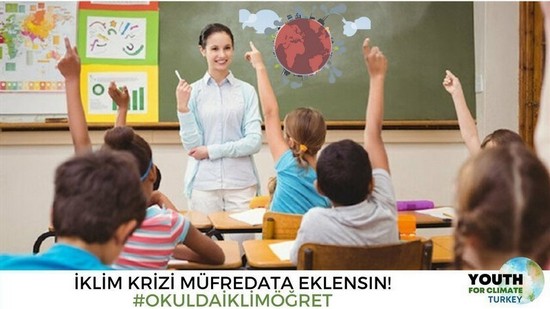Kategori : ENERGY AGENDA NEWS, ENERGY EFFICIENCY NEWS - Tarih : 27 June 2021
Our current education in our country is not sufficient in terms of climate change. Students are not prepared to face the effects of climate change or are not taught solutions, nor do they develop feelings of empathy that will enable them to connect with nature.
But we can change that.
Sustainability and climate change should be taught in the curriculum, and future generations should be equipped with the necessary knowledge and skills for the process of adaptation to living conditions and  the green jobs of the future. This education will give every young person the ability to contribute to a more resilient and sustainable society.
the green jobs of the future. This education will give every young person the ability to contribute to a more resilient and sustainable society.
The “Declaration for Children, Youth and Climate Action” prepared by the Children’s Environmental Rights Initiative ‘CERI’, the United Nations International Children’s Fund ‘UNICEF’ and the Young Climate Movement ‘YOUNGO’ in 2019 and signed by 12 countries, calls for climate change and environmental education and underlines the rights of the child, including the right to an environment.
Article 12 of the Paris Agreement commits parties to cooperate to increase and strengthen climate education, training, public awareness, public participation and public access to information on climate change.
In line with all these data, our demands are as follows:
– Education based on the best available science and data on climate change, sustainability and biodiversity should be widely available at all grade levels. School and university buildings and campuses should set an example of sustainability when creating curricula.
All school-age youth and children should be provided with comprehensive and up-to-date education on the climate emergency and ecological crisis, regardless of how they go to school. Such teaching should be tailored to alleviate and adapt to the current crisis and its consequences, giving all young people the information they need to understand the scope, nature and structural causes of the crisis.
– National laws should be enforced to provide free access to impartial climate science and data, and legal redress should be applied to those who make false claims about the climate emergency and ecological crisis.
– Considering the solution-oriented, egalitarian and creative abilities of young people, they should be included in the education curriculum preparation and decision-making process.
All school-age youth and children should be provided with the opportunity to learn about their ties to nature, including (but not limited to) the knowledge and practices of indigenous peoples.





